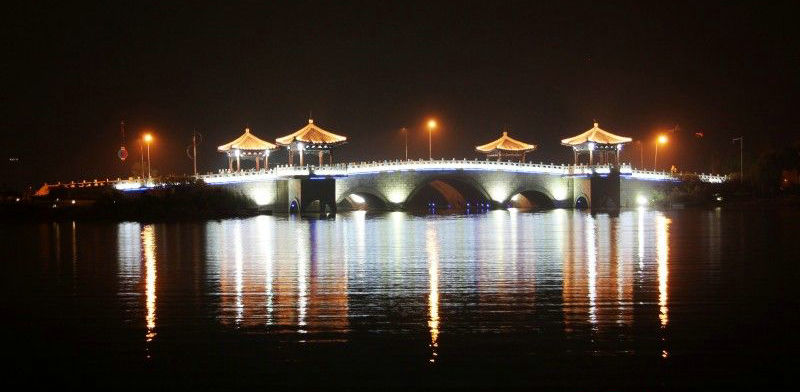 |
| The night view of Xuzhou [Photo/huodong.cnxz.com.cn] |
Located at the junction where north meets south and between Beijing and Shanghai, Xuzhou City boasts a long history, rich culture and gorgeous landscape. Its reputation as a famous Chinese historical and cultural city attracts tourists from far and wide.
Wondrous Culture of the Chu and Han Dynasties
Xuzhou has a history of over 6,000 years and was established as a city about 2,600 years ago. It is the hometown of Peng Zu, legendary figure in Chinese history, the place where Liu Bang, first emperor of the Han Dynasty, was born and the former capital designated by Xiang Yu when he proclaimed himself Overlord of Western Chu. Xuzhou can, therefore, be described as the birthplace of Han culture. The city’s scenic beauty and deep historical roots earn it the reputation of the “Athens of the Orient.”
Because of Xuzhou’s strategic location, the city has witnessed over 400 battles throughout history, the most famous being the Chu-Han Contention between Liu Bang and Xiang Yu at the end of the Qin Dynasty. The battle played out on Jiuli Mountain in northwestern Xuzhou. It was hardly a fair fight: Xiang Yu was 27 years old and a student of strict military training, whereas Liu Bang, a peasant’s son, was over 50 years old. However, Xiang Yu was defeated, while Liu Bang went on to unify China and found the Han Dynasty (206 BC-AD 220).
Liu Bang’s rule forms an abundant part of Xuzhou’s tangible cultural heritage today, including scenic spots such as the platform to sing the Song of the Great Wind (Gefeng Tai), the Sishui Pavilion, Drawing Sword Spring (Bajian Quan) and Maba Spring. Liu Bang also left intangible cultural heritage. According to Han expert Ma Peifeng, Liu Bang’s legacy includes the Chinese language and Chinese characters, as well as the model of “one country, two systems,” an emphasis on Confucianism, developing agriculture and exempting certain groups from tax. Liu Bang’s establishment of the Han culture roused the whole nation’s consciousness and self-respect for its cultural value.
At that time Xiang Yu declared Xuzhou to be the state capital. Xiang was born in today’s Suqian City, over 100 kilometers from Xuzhou. In fact, Suqian was formerly part of Xuzhou. The places of interest in Xuzhou that are related to Xiang Yu include Xima Tai (a horse racing viewing terrace). According to Luo Yongxin, director of Xuzhou Tourism Bureau, although historical records show that Xiang Yu was defeated by Liu Bang, both Liu Bang and Xiang Yu are equally admired and respected by locals. The Chu Garden, which was built to commemorate Xiang Yu, opened earlier this year.
Because of its geographic location and the changing course of the Yellow River, Xuzhou suffered persistent flooding in the past. Therefore, a large number of Han Dynasty relics are thought to be buried there. Since the 1980s, with the development of urbanization, many cultural relics have been excavated. Among them, the most representative are tombs, stone carvings and the terracotta army of the Han Dynasty.
There are 300 to 400 Han tombs in Xuzhou. To date, only two are open to visitors – the Guishan (Turtle Mountain) Tomb and Shizi (Lion) Mountain Tomb. They were built for princes during the Western Han Dynasty (206 BC - AD 24). The former features a delicate construction, the latter, exquisite unearthed cultural relics.
We recommend:
